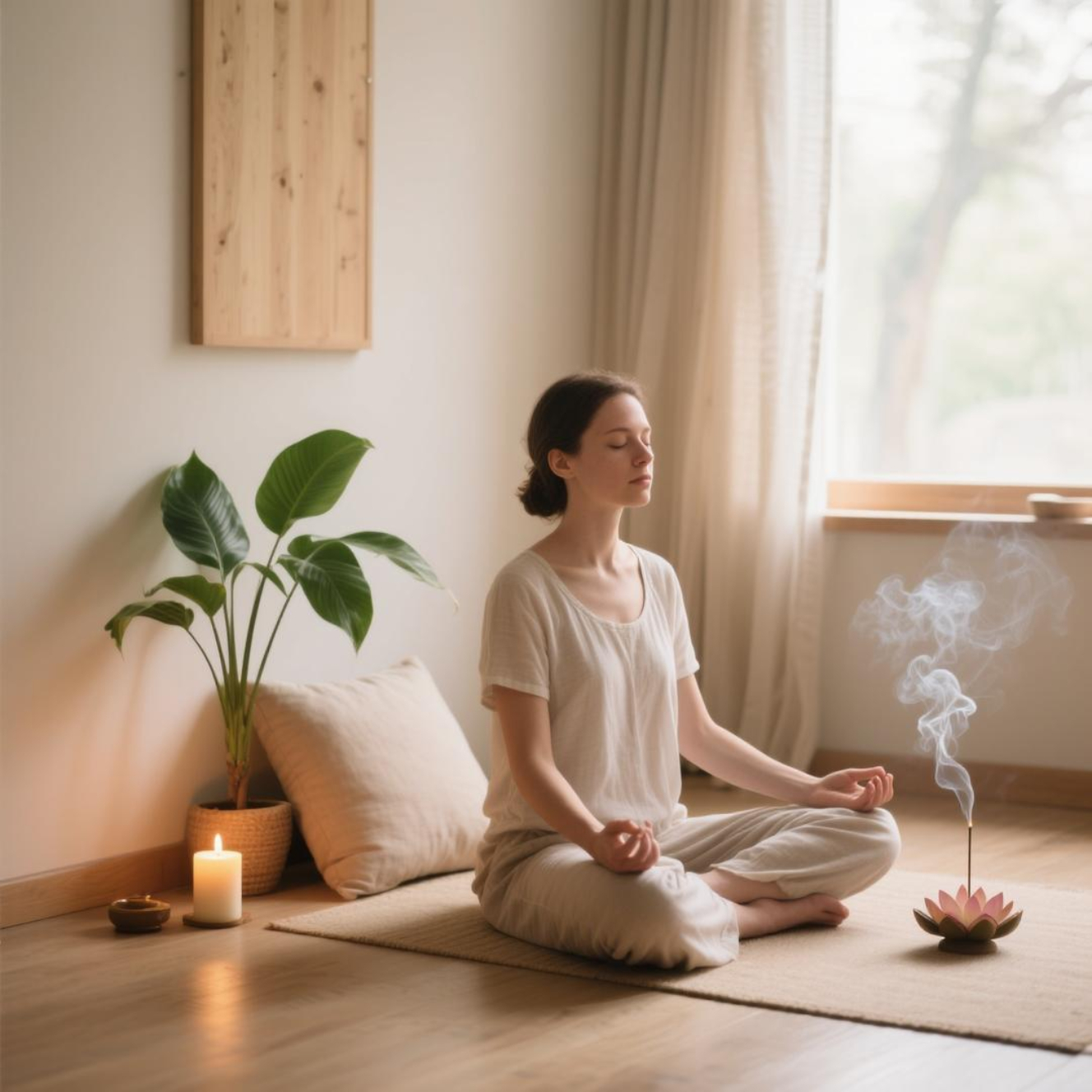The benefits of meditation go far beyond calming the mind. In times of anxiety, overstimulation, and packed schedules, stopping for a few minutes and simply breathing is an act of courage and self-care. Meditating is like taking the body out of autopilot mode and bringing awareness back to the present moment.
Each breath brings back focus. Each silent pause reconnects us with something that isn’t measured by productivity, but by presence. Starting with just five minutes a day can already transform your mood, your relationship with stress, and how you deal with challenges.
In this article, I’ll show you why meditation is one of the simplest — and most powerful — practices for anyone looking to find balance even on the busiest days. And the best part: it’s totally accessible, free, and effective.
Why Meditating Nowadays Is a Silent Urgency
We live in a world that constantly demands speed, multitasking, and quick responses. Our minds, conditioned to this pressure, almost never rest. We are connected to everything — except ourselves. This is where meditation becomes both a refuge and a tool for restoration.
The modern mind is overstimulated. We overthink, frequently experience anxiety, and have lost the ability to remain silent, even for a few seconds. This constant agitation drains vital energy, weakens immunity, disrupts sleep, and directly impacts our emotions.
Meditation is about slowing down from the inside out. It allows the body to rest deeply, even while awake. Over time, this practice becomes an anchor of peace, bringing clarity, discernment, and greater lightness to handle the pressures of everyday life.
What Are the True Benefits of Meditation
The benefits of meditation are widely studied by science and experienced in practice by millions of people worldwide. Starting with the reduction of cortisol, the stress hormone, which naturally decreases with regular mindfulness practice.
Another powerful effect is emotional regulation. Meditation helps the brain rewire neural connections, improving impulse control, strengthening resilience, and reducing recurring negative thoughts. This directly results in more empathy, patience, and balance in relationships.
Physically, meditation improves sleep quality, relieves muscle tension, and supports heart health. Mentally, it brings focus, clarity, and space between thoughts — resulting in greater productivity and less reactivity throughout the day.
How to Start a Meditation Practice Without Complication
Starting a meditation routine doesn’t need to be complicated. You don’t need special clothing or mystical environments. All you need is a quiet corner, a few minutes of your time, and the willingness to pause. It’s that simple.
The best time of day varies from person to person, but many beginners prefer to meditate first thing in the morning, when the mind is still free from external interference. Others prefer to meditate at the end of the day, as a closing ritual. Any time is valid, as long as you are present.
To begin, sit comfortably with a straight spine and close your eyes. Bring your attention to your breath — the air entering and leaving through your nostrils. Every time the mind gets distracted (and it will), simply acknowledge it and return to your breath. This is the practice. There’s no right or wrong, just practice.
Environment, Sounds, and Tools That Help Quiet the Mind
The environment where you meditate can greatly influence your experience. It’s worth preparing a cozy space that conveys calm and simplicity. It could be a corner of your bedroom, balcony, or even a spot in your office — what matters is feeling comfortable.
Some elements help create a peaceful atmosphere: a candle, a plant, a comfortable cushion, or soft incense. Relaxing sounds like instrumental music, nature sounds, or Tibetan bells can also help the mind settle more easily.
If you prefer, you can use apps or guided recordings. There are meditations with step-by-step instructions for focus, relaxation, sleep, and gratitude. These tools are excellent allies, especially for beginners who have difficulty maintaining focus.
What Changes in Mind and Body After 7, 21, and 60 Days of Meditation
In the first seven days of practice, the benefits of meditation are already noticeable. The body begins to respond with more calmness, sleep tends to improve, and thoughts slow down. Even those who feel restless notice a new space between stimulus and reaction.
After 21 days, the practice starts becoming a habit. The mind recognizes moments of pause as safe and necessary. There is more emotional clarity, less reactivity, and breathing becomes a natural ally in moments of tension.
At 60 days, the impact is profound: focus, body awareness, emotional stability, and presence in the now become increasingly constant. You feel more centered and less vulnerable to external chaos. Meditation then stops being just an exercise and becomes a way of life.
Silence That Heals: Meditation Is Simpler Than It Seems
Meditation is not about stopping the mind. It’s about observing. It’s recognizing what happens inside you with kindness and without judgment. It’s not about reaching an enlightened state, but about welcoming yourself in the present moment.
The silence we cultivate in daily practice has a restorative effect, almost like a balm for the nervous system. In it, we find answers that do not arise in the rush of life. It shows us that behind the agitation, there is always a serene place available.
The benefits of meditation are accessible to anyone willing to pause for a few minutes a day. Start today, without pressure. Over time, your mind will crave this moment. And you will realize that, in silence, there is more healing than in words.
